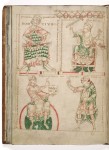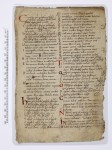Music that hasn’t been heard in hundreds of years was performed for the first time in almost a milennium at Pembroke College Chapel, University of Cambridge, on April 23rd. The concert was the culmination of years of research into medieval music notation which reconstructed lost melodies in a collection of songs drawn from philosopher Boethius’ great work The Consolation of Philosophy.
Anicius Manlius Severinus Boethius was a senator and consul of Rome born in the late 5th century to a patrician family, young Boethius was given an exceptional education, rare at that time even among the scions of wealthy, noble families. He distinguished himself at an early age, holding a number of important offices under Ostrogothic King Theodoric the Great. In 523, it all came crashing down when he was arrested for treasonous conspiracy with Byzantine Emperor Justin I against Theodoric. He was jailed for a year during which he wrote The Consolation of Philosophy. He was executed in 524, but his work far outlived him and became a seminal influence on medieval philosophy.
 Boethius also happened to be an accomplished mathematician and musician, and wrote another hugely influential treatise on the subject, The Principles of Music, which was still consider the essential text on the mathematics of music as late as the 18th century. Setting the Consolation, Boethius’ most famous work, to music, therefore, was a natural pursuit for medieval scholars. An 11th century manuscript in the Cambridge University Library known as the Cambridge Songs is a collection of texts that were in use at the Canterbury Cathedral Priory at the time. At the back of the book are some Boethian texts and a few of the famous Carmina Burana poems set to music.
Boethius also happened to be an accomplished mathematician and musician, and wrote another hugely influential treatise on the subject, The Principles of Music, which was still consider the essential text on the mathematics of music as late as the 18th century. Setting the Consolation, Boethius’ most famous work, to music, therefore, was a natural pursuit for medieval scholars. An 11th century manuscript in the Cambridge University Library known as the Cambridge Songs is a collection of texts that were in use at the Canterbury Cathedral Priory at the time. At the back of the book are some Boethian texts and a few of the famous Carmina Burana poems set to music.
The symbols representing the musical notation, called neumes, recorded the melody, not the pitch, and instead of having a one-to-one correspondence between notation and sound, the neumes relied on the aural traditions and memories of the musicians to fill in the details of a melodic outline. Those traditions died off in the 12th century and without the essential contribution of musicians’ knowledge, the music recorded in early medieval manuscripts became unreadable.
 Cambridge University’s Dr. Sam Barrett has spent 20 years studying neumes and reconstructing the lost knowledge that made the songs playable. An important piece of the puzzle was a leaf from the Cambridge Songs with Boethius songs that was cut out of the manuscript by a German scholar in the 1840s. He donated it to a Frankfurt library where it remained unremarked upon until 1982 when it was recognized as purloined by historian Margaret Gibson and returned to Cambridge. This rediscovery of this one page was of major import to Barrett’s work because its density of notations allowed him “to achieve a critical mass that may not have been possible without it.”
Cambridge University’s Dr. Sam Barrett has spent 20 years studying neumes and reconstructing the lost knowledge that made the songs playable. An important piece of the puzzle was a leaf from the Cambridge Songs with Boethius songs that was cut out of the manuscript by a German scholar in the 1840s. He donated it to a Frankfurt library where it remained unremarked upon until 1982 when it was recognized as purloined by historian Margaret Gibson and returned to Cambridge. This rediscovery of this one page was of major import to Barrett’s work because its density of notations allowed him “to achieve a critical mass that may not have been possible without it.”
“After rediscovering the leaf from the Cambridge Songs, what remained was the final leap into sound,” [Barrett] said. “Neumes indicate melodic direction and details of vocal delivery without specifying every pitch and this poses a major problem. The traces of lost song repertoires survive, but not the aural memory that once supported them. We know the contours of the melodies and many details about how they were sung, but not the precise pitches that made up the tunes.”
After piecing together an estimated 80-90 per cent of what can be known about the melodies for The Consolation of Philosophy, Barrett enlisted the help of Benjamin Bagby of Sequentia — a three-piece group of experienced performers who have built up their own working memory of medieval song. Bagby, co-founder of Sequentia, is also a director of the Lost Songs Project which is already credited with bringing back to life repertoires from Beowulf through to the Carmina Burana.
Over the last two years, Bagby and Barrett have experimented by testing scholarly theories against the practical requirements of hand and voice, exploring the possibilities offered by accompaniment on period instruments. Working step-by-step, and joined recently by another member of Sequentia, the harpist-singer Hanna Marti, songs from The Consolation of Philosophy have now been brought back to life.
Alas, there is no recording of the April 23rd performance online that I could find. I’ll update the post when there is. Meanwhile, here are two all-too-short excerpts of the reconstructed music. The first piece is played by all three members of Sequentia, from left to right Benjamin Bagby, Hanna Marti and Norbert Rodenkirchen, the second by Hanna Marti and Norbert Rodenkirchen.
[youtube=https://youtu.be/PwAKPIUKAyM&w=430]
[youtube=https://youtu.be/q14wI3cZoDQ&w=430]